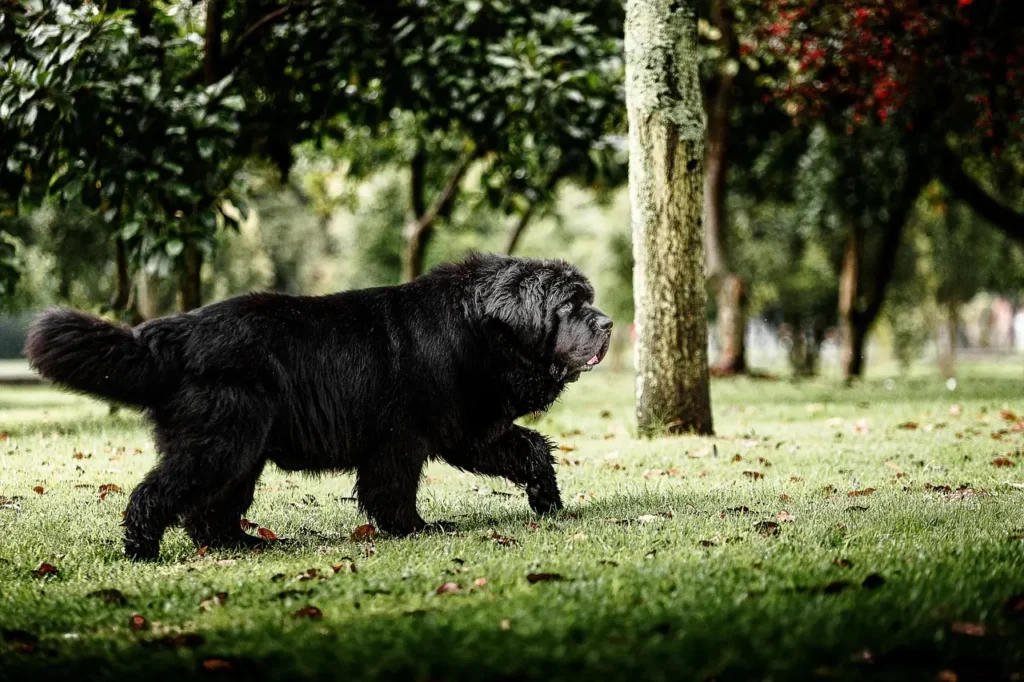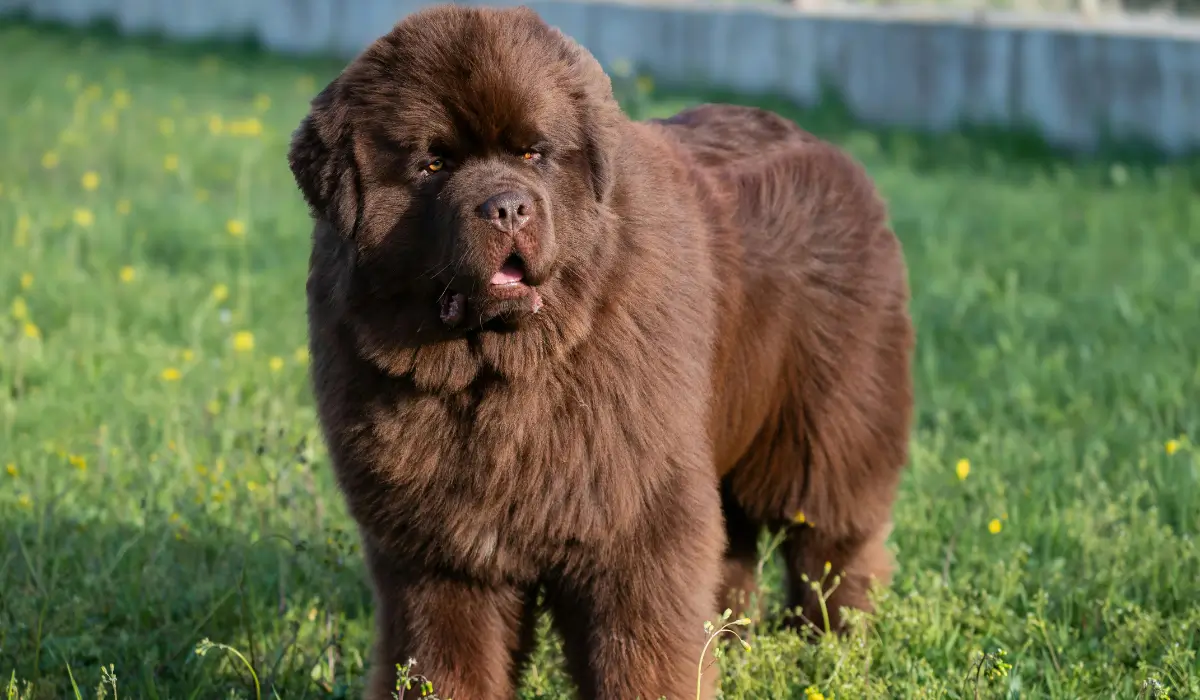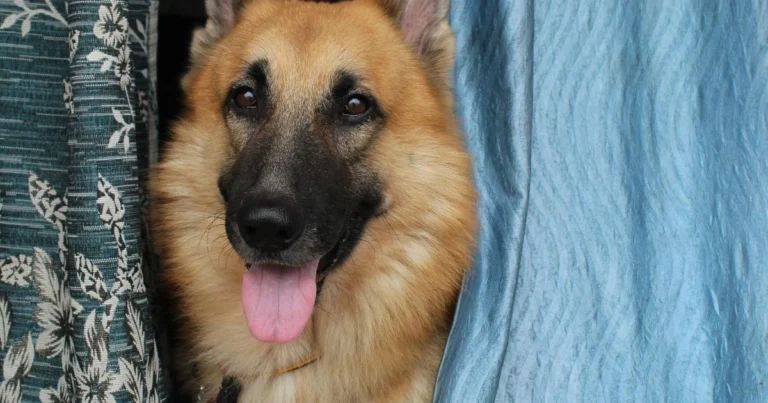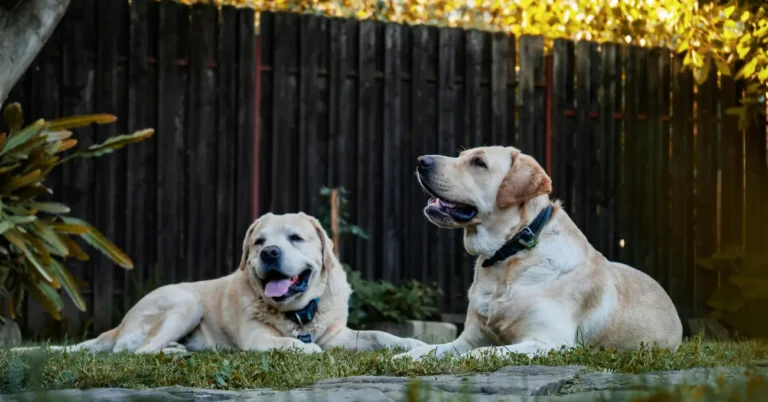Newfoundland Dogs: 10 Incredible Traits That Make Them Truly Special
Introduction
Newfoundland Dogs They are gregarious big breeds of dogs engaged with their humans. There is nothing more they love than to be of assistance, these soaking wet athletes will always rally to the cause of lending a helping hoof.
These dogs see children as companions and therefore make perfect playmates for any young family. Inborn lovers of children, they serve as perfect pillows for them. The soft, cuddly Newfoundland will keep a still, reassuring presence by your side until they sense the right moment to wrap their arms around you.
Table of Contents
1. Water-Resistant Fur
Overview
Newfoundland Dogs sport a thick double coat that possesses a certain oily essence, which helps these canines swim in frigid waters. Insulated by their fur, the Newfie can swim and rescue individuals out in the oceans without flinching. In fact, Newfoundlanders have been blessed with great claws and webbed toes, and they can swim and rescue individuals when the waters are torrential. These abilities pull holidaymakers involved in dangerous situations for swimming already to safety.
Why Their Temperament Matters
Newfoundlanders dogs possess a rather oily double coat of thick fur that permits them to swim in icy waters. Isolated by thick fur, they can swim to rescue victims struggling in icy waters without a shiver. In fact, the Newfoundland has webbed feet that propel them stun-beyond-ordinary distances. Thus, one will see many a life skillability, nautical festival and questions both among Newfoundlanders.
- It closely bonds with its family. Newfoundlands are generally calm and stable, contrary to some other breeds that could show anxiety or agitation.
- Good with Kids: With their easygoing temperament, they make wonderful companions for small children. Their protective instincts combine with a certain patience that allows them to handle rough games without losing their gentle touch.
- Good with Other Animals: Newfoundlands are known to coexist peacefully with other dogs, cats, and other smaller animals. Sociable by nature, they generally get along with everybody without much of a problem.

2. Majestic Size and Physical Strength
Overview
Newfoundlands are large from the first glance. You quickly notice a breed that averages around 130-150 pounds for males and 100-120 pounds for females. Thus, undoubtedly, size has an extreme weight behind it. And yes, size matters; in fact, they are mighty, stout dogs, built to perform physical work, such as pulling carts and operating in water for rescues.
Effect of Their Size on History
It was to create this breed that it developed for heavy-duty tasks like hauling and rescue in treacherous waters. Such tasks are enabled through their muscular build and nature’s architecture for effortless swimming in their large-webbed feet.
Working Dog Status: Historically, Newfoundlands were working dogs, often for fishermen pulling nets and rescuing potential drowning victims. Their size allows them to carry on tasks requiring strength and endurance.
Size and care: While large bodies give them good impression, these also require space to move about. If you stay alone within a small apartment with no yard, a Newfoundland is not for you.
3. Double Coat: Adaptation for Cold Waters
Overview
The most unique physical characteristic of Newfoundlands is their thick double coat, an adaptation that allows them to work in freezing waters, where they would recover or haul runaway boats. A Newfoundland’s coat consists of two layers; there is a dense, wooly underlayer and a longer outer layer that is water resistant.
Grooming and Coat Care
Because of this double coat, Newfoundlanders need to stay on top of grooming. Regular brushing is crucial to keep their coat tangle-free and avoid excessive shedding, especially in spring or fall. The thick coat of Newfoundlanders requires a bit more grooming than other breeds because it provides insulation against cold water.
Brushing Requirements: They shed through the year but tend to shed more determinedly during springs and autumns. Thus, they require brushing regularly through the year.
Coat Maintenance: Bathing and trimming is a very important process of coat health and functionality.
4. Water-loving Nature
Overview
It comes without saying that the Newfoundland, being a breed initially developed for water work, loves water. Be their swimming, diving, or just playing and splashing around, Newfoundlanders feel quite at home in all aquatic surroundings. Their webbed feet help them glide easily through the water, while the heavy coat provides insulation against the cold.
Why They Love Water
The love for water is so innate in Newfoundlanders that it has become second nature to them, often instinctively jumping into the water whenever an opportunity presents itself. This instinct has been perfected over generations of working with fishermen and saving lives on the waters. It is not so much swimming for pleasure as it is inherently what they new.
Swim Training Tips: When you introduce your Newfoundland to swimming, begin in shallow water and work your way toward deeper water. While these dogs definitely take to swimming well, close supervision is very much recommended.
Incredible Lifeguards: They were, once upon a time, used in water rescues, owing to their strength, buoyancy, and natural instinct to swim efficiently.
5. High Intelligence and Trainability
General Information
Newfoundlands are highly intelligent dogs.This is arguably the more the better point to train this breed.Among other breeds, they have a natural instinct to follow commands and learn new tasks, which gives them different preferences-a perfect match for competitive obedience or just any household chores, in short.
Training a Newfoundland
Due to their intelligence, Newfies are easy-going in terms of trainability-they should pick up commands, tricks, etc., pretty easily, especially when positive training and lots of rewards accompany such training. Still, considering their size and strength, early training is advisable to get them familiarized with respect to any behavioral dispositions concerning their bulky posturing.
Training Methods: Works better with Newfoundlands is positive reinforcement. Rewarding good behavior goes along with treats and praise.
Socialization: It is necessary that socialization happens early, so Newfoundlands can be raised as rounded dogs. Expose them to diverse issues such as people, environments, and other pets, so they can eventually remain amicable and adaptable.
6. Loyal Companions and Family Dogs
General Information
Newfoundlands are devoted and loyal companions. Once a bond is created, the Newfoundland will stick by your side through thick and thin. This loyalty takes them to another level of excellence as family dogs-ideal companions, especially with children and the elderly.Furthermore, due to their protective nature, they will take care of you and often act as a natural watchdog.
Why Loyalty Matters
One of the most lovable qualities about them is loyalty. Newfoundlands are referred to as “velcro dogs”, simply because they love to be close to their family. They would be very happy to be beside you on the couch or be on your heels going from one room to the other.
A Family Connection: If you’re looking for a pup that will always be attached to you, then go with Newfoundlands. They create unconditional bonds and are happiest when they form part of a family unit.
Protective Instincts: They are all friendly yet slightly protective, making them good guards for their families.
7. Daily Exercise Requires Moderate Exercise
Synopsis
Although these dogs physically tend toward the large and powerful end of the spectrum, Newfoundlands are not overly demanding of exercise. They are not hyperactive dogs, can put up with low to moderate physical activity. Most of them will consider a daily walk followed by some yard play and maybe a swim from time to time to be adequate exercise.
Exercise Requirements
This breed doesn’t have as tight an exercise regime as some of the other breeds. However, enough light exercise should be given to prevent their excessive weight gain, pressuring their joints.
Daily Exercise: About half an hour to 45 minutes of moderate exercise every day, walking, swimming, or gentle play.
Avoid Overexertion: Due to their weight and size, Newfoundlands can be prone to developing joint issues, so it is best not to overexercise them lest it hammers any stresses on the animal’s muscles and joints.
8. Health Considerations and Lifespan
Health Issues and Longevity
Overview
Like all breeds, Newfoundlands sometimes have health problems where their large size is especially important. Common health problems include hip dysplasia, heart disorders, and obesity. Newfoundlands can live a reasonably long life, 8 to 10 years, if they are taken care of correctly.
Manage Health Risks
Keeping their health issues in mind through veterinary check-ups and good nutrition is essential in the approach to be taken to treat them in case of any ailment. Any health disorders should be detected early to handle the matter before it gets serious.
Common Health Problems: Hip dysplasia, heart diseases, and obesity are common findings in Newfoundlands. Regular check-ups and an effort toward maintaining a healthy weight will help manage these risks.
Preventive Medicine: Good exercise, a good diet, and vet checks at least a few times a year are all critical to keeping Newfoundland happy and healthy.
9. Grooming and Coat Maintenance
Overview
Newfoundlands have an exceedingly thick coat double however needs constant brushing to remain in good condition. This not only provides warmth but also boosts to their majestic appearance. Grooming a Newfoundland requires a good amount of effort, but it is worth undertaking, for his luxurious coat.
Grooming the Newfoundland
Some brushing should be done each week though it is probable that additional brushing will be required during shedding season. Bathing should take place as necessary-not more than once every two to three months unless the dog gets very dirty.
Brushing Technique: High-quality brushes designed for thick coats must be the most elegant ones. Tangles and mats are likeliest to form in areas behind the ears or under the legs.
Bathing A Newfoundland: When bathing by hand, care should be exercised, so a mild shampoo suitable for dogs with sensitive skin is recommended.
10. Other Potential Challenges of Owning a Newfoundland
The Overview
Newfoundlands are great pets. Even with such great attributes, they still come with their own challenges. Their very large size, the frequent grooming they need, and the periodic health concerns may call for more time and attention. However, these challenges could be faced and managed if they are properly prepared for.
Challenges to Keep in Mind
Before you adopt a Newfoundland, there are certain challenges one must keep in mind. Their size is inadequate for most apartments and homes lacking required space. The separation problems associated with the dog’s grooming require regular attention.
Space Requirements: There must be enough space in your life for a dog of their size. Homes with backyards of sufficient size or access to outdoor spaces gain a great edge while rearing Newfoundlands.
Subsequent Health Management: Be prepared for providing the medical care of a devoted pet, including being ready at times to make appointments with vets and diligently following appropriate practices.
In Conclusion
Newfoundlands are rare dogs and are gentle giants with large builds and loving hearts, thus an excellent match for the right type of family. But the ownership of a Newfoundland, like other dog types, comes with responsibilities: grooming, health aspects, and exercise. By acquiring knowledge of their traits and almost preparing for their needs, you can ensure your Newfoundland dares to thrive in your abode.
If you are ready to get the Newfoundland dog into youredirection! Remember that with them comes both joy and responsibility to bring up this wonderful breed. They will give you immense love, loyalty, and sometimes get in the water for you!







